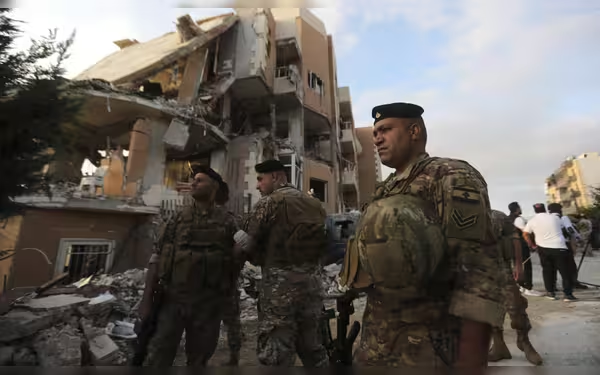Saturday, November 16, 2024 08:22 PM
Hezbollah-Israel Conflict: Lebanese Army's Limited Role
- Lebanese army observes clashes without direct engagement.
- Hezbollah outnumbers Lebanese army significantly.
- International aid impacts army's operational capacity.
 Image Credits: arabnewspk
Image Credits: arabnewspkThe Lebanese army remains sidelined as Hezbollah and Israel clash, facing significant challenges amid ongoing regional tensions.
In recent weeks, the conflict between Hezbollah and Israel has escalated significantly, particularly following Israel's ground invasion of Lebanon. This situation has placed the Lebanese army in a challenging position, as it finds itself largely observing the clashes from the sidelines. The Lebanese army, which is often seen as a unifying force in a country marked by sectarian divisions, is now grappling with its own limitations amid this ongoing conflict.
The Lebanese army, with approximately 80,000 troops, is significantly outmatched by Hezbollah, which boasts over 100,000 fighters. This disparity in numbers is compounded by the fact that Hezbollah's arsenal is more advanced, largely due to support from Iran. The Lebanese army, facing an aging arsenal and a lack of air defenses, is ill-equipped to confront a modern military force like Israel's. This has led to a cautious response from the army, which has repositioned its troops away from the border to avoid direct confrontation.
Since the beginning of the clashes on October 8, 2023, when Hezbollah began firing rockets in support of Hamas, the situation has only intensified. Israel has conducted extensive aerial bombardments and ground operations aimed at pushing Hezbollah back from the border. Despite these provocations, the Lebanese army has refrained from engaging directly, instead opting to withdraw from observation posts and maintain a defensive posture.
Former Lebanese Army General Hassan Jouni has stated that the army's primary mission is to defend Lebanon against any invading force. However, he emphasized that any response would be limited by the army's current capabilities, highlighting the delicate balance the army must maintain in this volatile environment. The Lebanese army's history of being overshadowed by Hezbollah during previous conflicts further complicates its role in the current situation.
Historically, the Lebanese army has played a peripheral role during Israeli invasions, with the notable exception of 1972 when it managed to slow down Israeli advances. However, the internal strife and the civil war that erupted in 1975 severely weakened the army's capabilities. The aftermath of the civil war saw Hezbollah emerge as a dominant force, retaining its weapons under the pretext of resisting Israeli occupation.
International aid has been a double-edged sword for the Lebanese army. While it has received significant military assistance, particularly after the Syrian civil war, the economic collapse in Lebanon has severely impacted its operational capacity. Soldiers now earn a meager salary, forcing many to seek additional work to make ends meet. The United States has been a key supporter of the Lebanese army, providing around $3 billion in military aid since 2006, but this support is often politically contentious.
As the situation continues to unfold, the Lebanese army's ability to respond effectively remains in question. The hope is that it can play a stabilizing role in the region, but the reality is that it faces significant challenges. The ongoing conflict serves as a stark reminder of the complexities of Lebanon's political landscape and the delicate balance of power within the country. Ultimately, the future of the Lebanese army and its role in this conflict will depend on both internal reforms and external support, as it navigates the treacherous waters of regional tensions.













